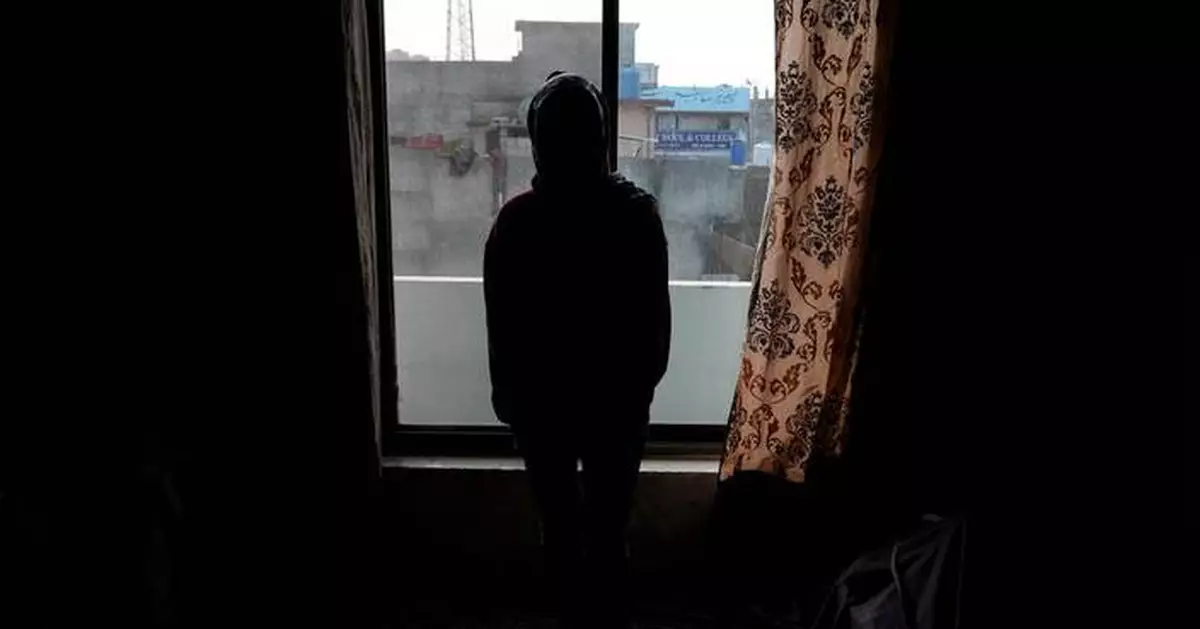ISLAMABAD (AP) — Afghans who fled after the Taliban seized power appealed Wednesday to U.S. President Donald Trump to exempt them from an order suspending the relocation of refugees to the United States, some saying they risked their lives to support U.S. troops.
An estimated 15,000 Afghans are waiting in Pakistan to be approved for resettlement in the U.S. via an American government program. It was set up to help Afghans at risk under the Taliban because of their work with the U.S. government, media, aid agencies and rights groups, after U.S. troops pulled out of Afghanistan in 2021, when the Taliban took power.
But in his first days in office, Trump's administration announced the U.S. Refugee Admissions Program would be suspended from Jan. 27 for at least three months. During that period, the White House said the secretary of homeland security in consultation with the secretary of state will submit a report to the president on whether the resumption of the program is in the U.S. interest.
Refugees who had been approved to travel to the United States before Jan. 27 have had their travel plans canceled by the Trump administration. Among those affected are the more than 1,600 Afghans cleared to resettle in the U.S. That number includes those who worked alongside American soldiers during the war as well as family members of active-duty U.S. military personnel.
There was no immediate comment from Pakistan, where authorities have urged the international community to decide the fate of 1.45 million Afghan refugees, saying they cannot stay indefinitely.
“Many of us risked our lives to support the U.S. mission as interpreters, contractors, human rights defenders, and allies,” an advocacy group called Afghan USRAP Refugees — named after the U.S. refugee program — said in an open letter to Trump, members of Congress and human rights defenders.
“The Taliban regard us as traitors, and returning to Afghanistan would expose us to arrest, torture, or death,” the group said. “In Pakistan, the situation is increasingly untenable. Arbitrary arrests, deportations, and insecurity compound our distress.”
Hadisa Bibi, a former student in Kabul who fled to neighboring Pakistan last month, said she read in newspapers that Trump suspended the refugee program.
“Prior to restrictions on women’s education in Afghanistan, I was a university student,” she said. “Given the risks I face as a women’s rights advocate, I was hoping for a swift resettlement to the United States. This would not only allow me to continue my higher education but also offer a safer and brighter future.”
She said she witnessed several Afghans arrested by Pakistani police, which left her in fear, "confined to my room like a prisoner.”
Mahnoosh Monir said she was a medical student in Afghanistan when her education was “cruelly suspended by the Taliban." Before fleeing to Pakistan, she worked as a teacher at a language center but it also was shut by the Taliban.
“Afghanistan is no longer a place for any girl or woman to survive," she said, adding she was disappointed by Trump's move.
“I didn’t expect this suspension to happen. A long span of waiting makes us think of very disappointing probabilities like being sent back to Afghanistan or waiting for a long time in Pakistan as a refugee at risk, which are like nightmares to all case holders," she said.
The Taliban have deprived 1.4 million Afghan girls of schooling through bans, according to the United Nations. Afghanistan is the only country in the world that bans female secondary and higher education.
Both Bibi and Monir applied for relocation and are still waiting. Over time, the visa process for Afghans who demonstrate they are at risk of persecution has become protracted.
Another Afghan woman, Farzana Umeed, and a man, Sarfraz Ahmed, said in an interview on the outskirts of Islamabad they were traumatized by the suspension of the program.
“I virtually wept last night when we heard this news,” Umeed said. She said it was difficult for her to live in Pakistan, and she could not travel to America either. “Returning to my home country also means taking a huge risk. What should I do? she asked, and urged Trump to reverse his decision.
Those in exile in Pakistan include Afghan journalists who were forced to escape Taliban rule to save their lives, and now face “extreme anxiety under the recurring threat of arbitrary arrest, police harassment and deportation to Afghanistan,” Reporters Without Borders said Wednesday.
The media watchdog urged Pakistan to ensure the protection of these journalists, who say their visa is extended only for a month for a $100 fee.
According to the Afghan USRAP Refugees group, flights to the U.S. for many Afghans had been scheduled for January, February and March after they were interviewed by the International Organization for Migration and U.S. Embassy officials.
“We seek the reversal of the ban on the refugee program on humanitarian grounds,” said Ahmad Shah, a member of the group, who was hoping to leave Pakistan for the United States in March after undergoing all interviews and medical tests.
In addition to Pakistan, more than 3,200 Afghans are staying in Albania. A NATO member, Albania first agreed to house Afghans for one year before they moved for final settlement in the United States, then pledged to keep them longer if their visas were delayed.
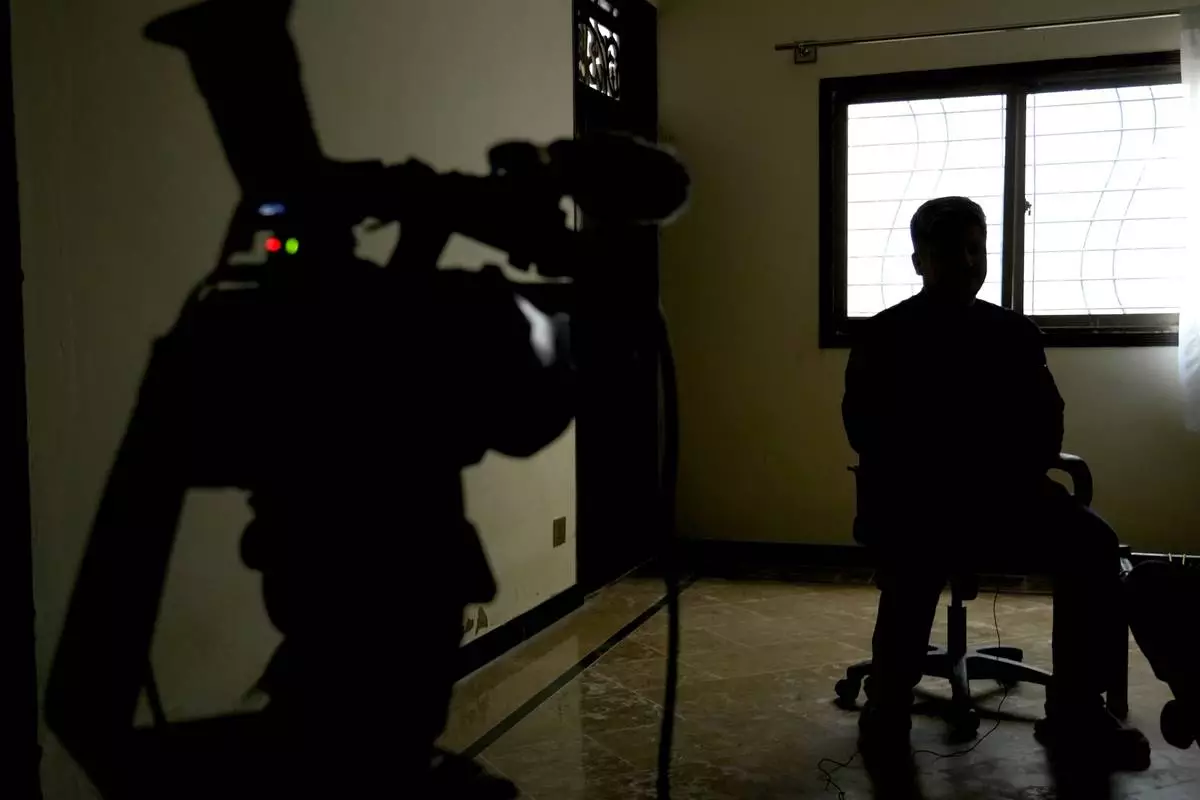
An Afghan refugee man, who asked not to use his name and not to show his face fearing his identity could lead to his capture, speaks during an interview with The Associated Press, in Islamabad, Pakistan, Wednesday, Jan. 22, 2025. (AP Photo/Anjum Naveed)
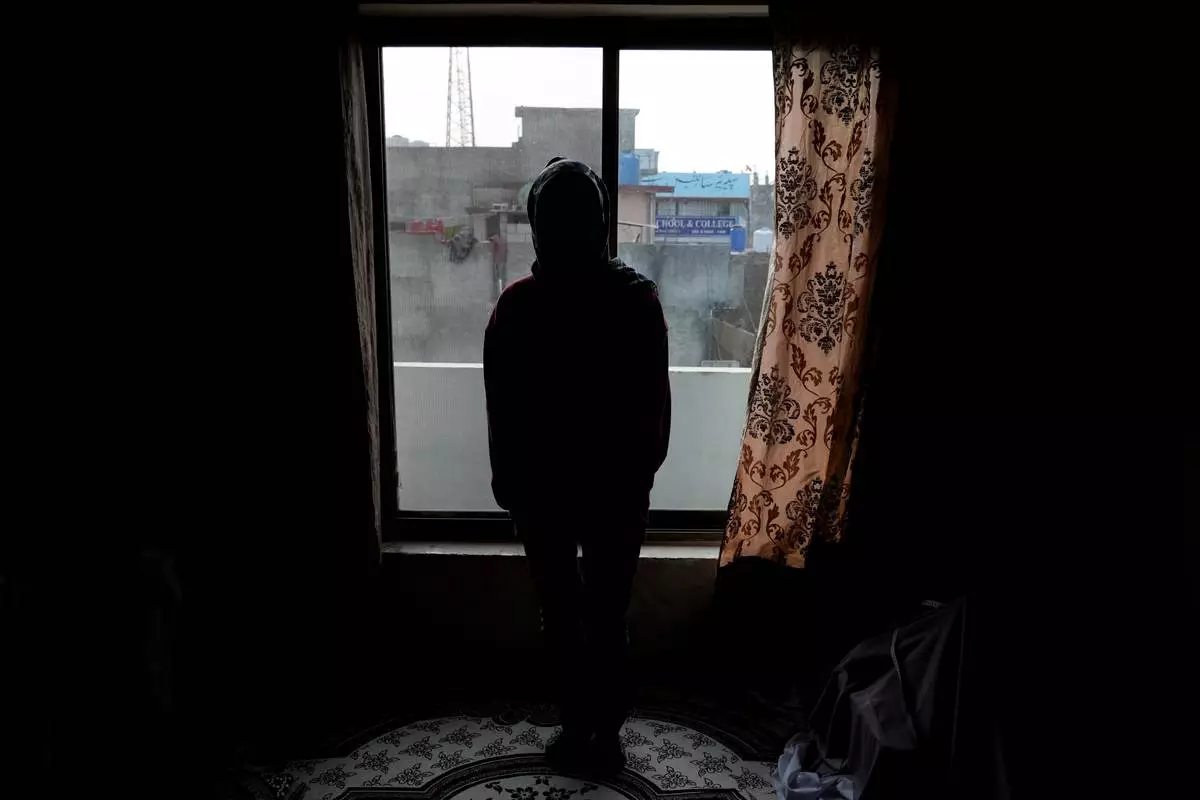
An Afghan refugee woman, who asked not to use her name and not to show her face fearing her identity could lead to her capture, poses for photographer following her interview with The Associated Press, in Islamabad, Pakistan, Wednesday, Jan. 22, 2025. (AP Photo/Anjum Naveed)
MINNEAPOLIS (AP) — Federal agents carrying out immigration arrests in Minnesota's Twin Cities region already shaken by the fatal shooting of a woman rammed the door of one home Sunday and pushed their way inside, part of what the Department of Homeland Security has called its largest enforcement operation ever.
In a dramatic scene similar to those playing out across Minneapolis, agents captured a man in the home just minutes after pepper spraying protesters outside who had confronted the heavily armed federal agents. Along the residential street, protesters honked car horns, banged on drums and blew whistles in attempts to disrupt the operation.
Video of the clash taken by The Associated Press showed some agents pushing back protesters while a distraught woman later emerged from the house with a document that federal agents presented to arrest the man. Signed by an immigration officer, the document — unlike a warrant signed by a judge — does not authorize forced entry into a private residence. A warrant signed by an immigration officer only authorizes arrest in a public area.
Immigrant advocacy groups have conducted extensive “know-your-rights” campaigns urging people not to open their doors unless agents have a court order signed by a judge.
But within minutes of ramming the door in a neighborhood filled with single-family homes, the handcuffed man was led away.
More than 2,000 immigration arrests have been made in Minnesota since the enforcement operation began at the beginning of December, said Homeland Security spokesperson Tricia McLaughlin.
Homeland Security Secretary Kristi Noem told Fox News on Sunday that the administration would send additional federal agents to Minnesota to protect immigration officers and continue enforcement.
The Twin Cities — the latest target in President Donald Trump’s immigration enforcement campaign — is bracing for what is next after 37-year-old Renee Good was shot and killed by an immigration officer on Wednesday.
“We’re seeing a lot of immigration enforcement across Minneapolis and across the state, federal agents just swarming around our neighborhoods,” said Jason Chavez, a Minneapolis city councilmember. “They’ve definitely been out here.”
Chavez, the son of Mexican immigrants who represents an area with a growing immigrant population, said he is closely monitoring information from chat groups about where residents are seeing agents operating.
People holding whistles positioned themselves in freezing temperatures on street corners Sunday in the neighborhood where Good was killed, watching for any signs of federal agents.
More than 20,000 people have taken part in a variety of trainings to become “observers” of enforcement activities in Minnesota since the 2024 election, said Luis Argueta, a spokesperson for Unidos MN, a local human rights organization .
“It’s a role that people choose to take on voluntarily, because they choose to look out for their neighbors,” Argueta said.
The protests have been largely peaceful, but residents remained anxious. On Monday, Minneapolis public schools will start offering remote learning for the next month in response to concerns that children might feel unsafe venturing out while tensions remain high.
Many schools closed last week after Good’s shooting and the upheaval that followed.
While the enforcement activity continues, two of the state’s leading Democrats said that the investigation into Good's shooting death should not be overseen solely by the federal government.
Minneapolis Mayor Jacob Frey and U.S. Sen. Tina Smith said in separate interviews Sunday that state authorities should be included in the investigation because the federal government has already made clear what it believes happened.
“How can we trust the federal government to do an objective, unbiased investigation, without prejudice, when at the beginning of that investigation they have already announced exactly what they saw — what they think happened," Smith said on ABC’s "This Week."
The Trump administration has defended the officer who shot Good in her car, saying he was protecting himself and fellow agents and that Good had “weaponized” her vehicle.
Todd Lyons, acting director of U.S. Immigration and Customs Enforcement, defended the officer on Fox News Channel’s “The Sunday Briefing.”
"That law enforcement officer had milliseconds, if not short time to make a decision to save his life and his other fellow agents,” he said.
Lyons also said the administration’s enforcement operations in Minnesota wouldn't be needed “if local jurisdictions worked with us to turn over these criminally illegal aliens once they are already considered a public safety threat by the locals.”
The killing of Good by an ICE officer and the shooting of two people by federal agents in Portland, Oregon, led to dozens of protests in cities across the country over the weekend, including New York, Los Angeles, Washington D.C. and Oakland, California.
Contributing were Associated Press journalists Giovanna Dell’Orto in Minneapolis; Thomas Strong in Washington; Bill Barrow in Atlanta; Christopher Weber in Los Angeles; and John Seewer in Toledo, Ohio.
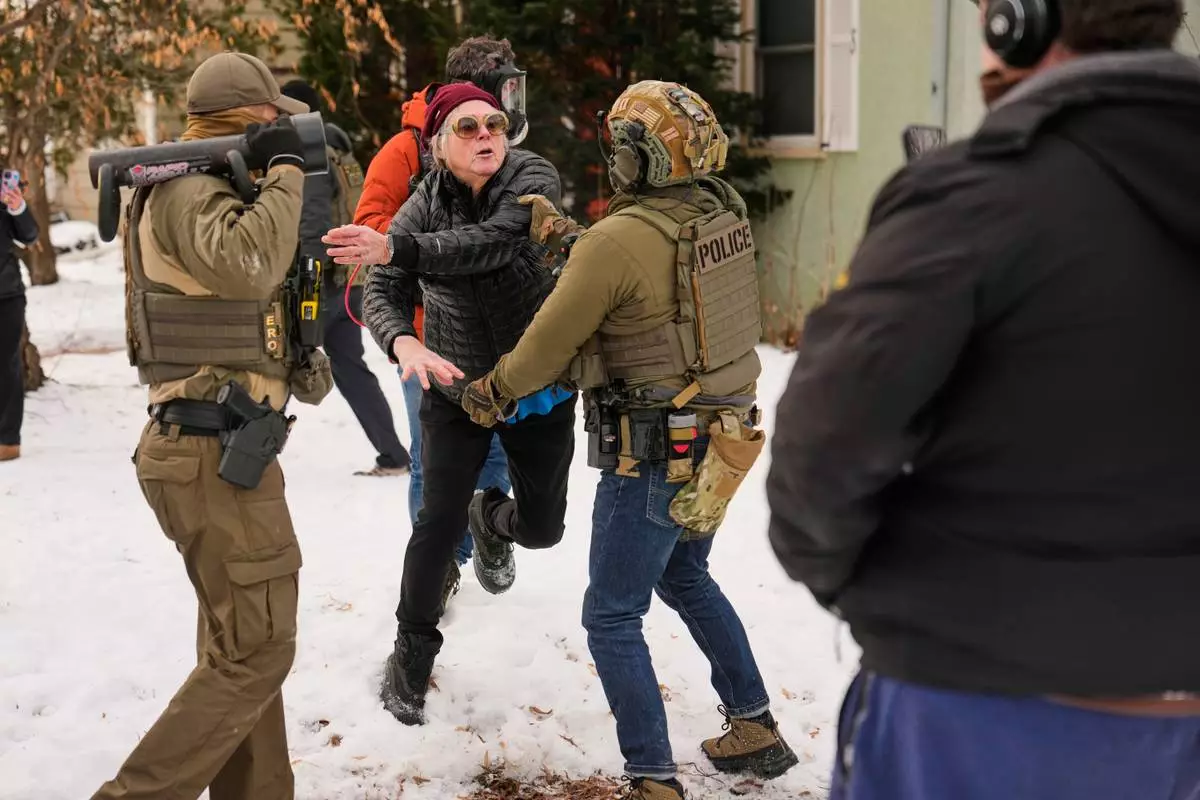
A woman gets into an altercation with a federal immigration officer as officers make an arrest Sunday, Jan. 11, 2026, in Minneapolis. (AP Photo/John Locher)

A federal immigration officer deploys pepper spray as officers make an arrest Sunday, Jan. 11, 2026, in Minneapolis. (AP Photo/John Locher)
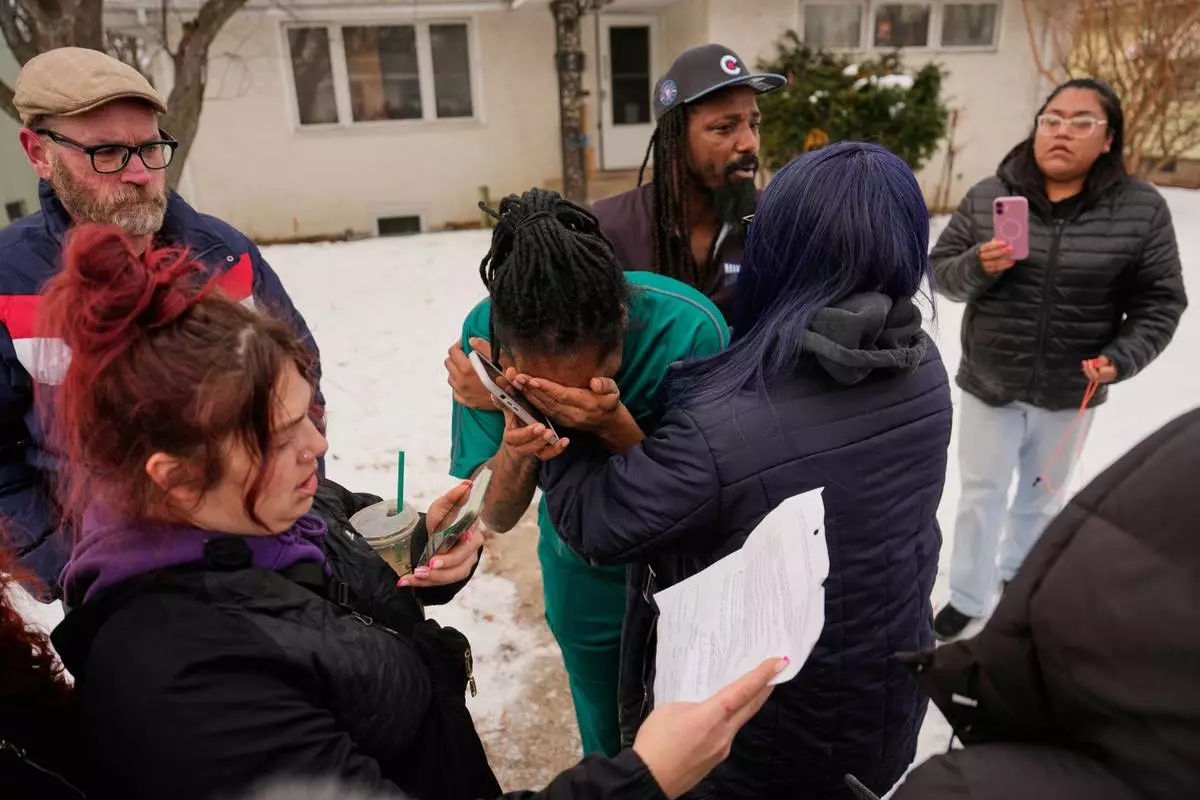
A family member, center, reacts after federal immigration officers make an arrest Sunday, Jan. 11, 2026, in Minneapolis. (AP Photo/John Locher)
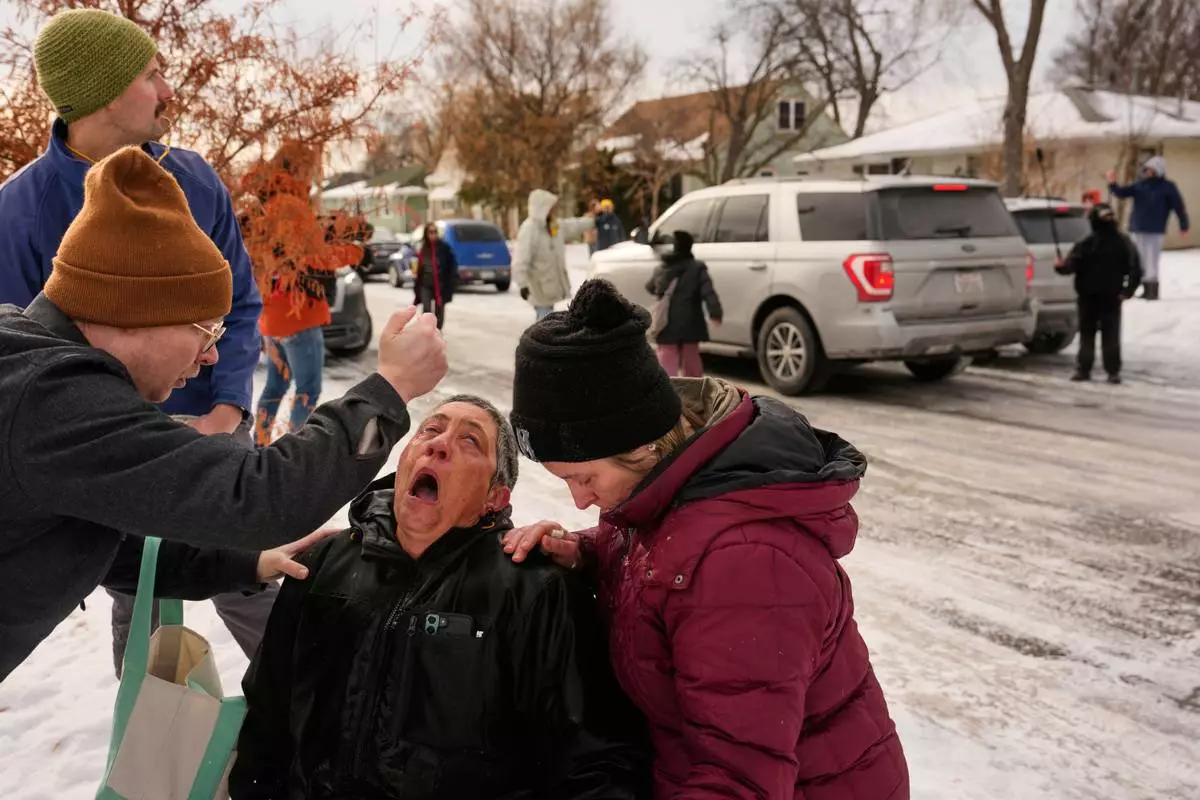
Bystanders are treated after being pepper sprayed as federal immigration officers make an arrest Sunday, Jan. 11, 2026, in Minneapolis. (AP Photo/John Locher)
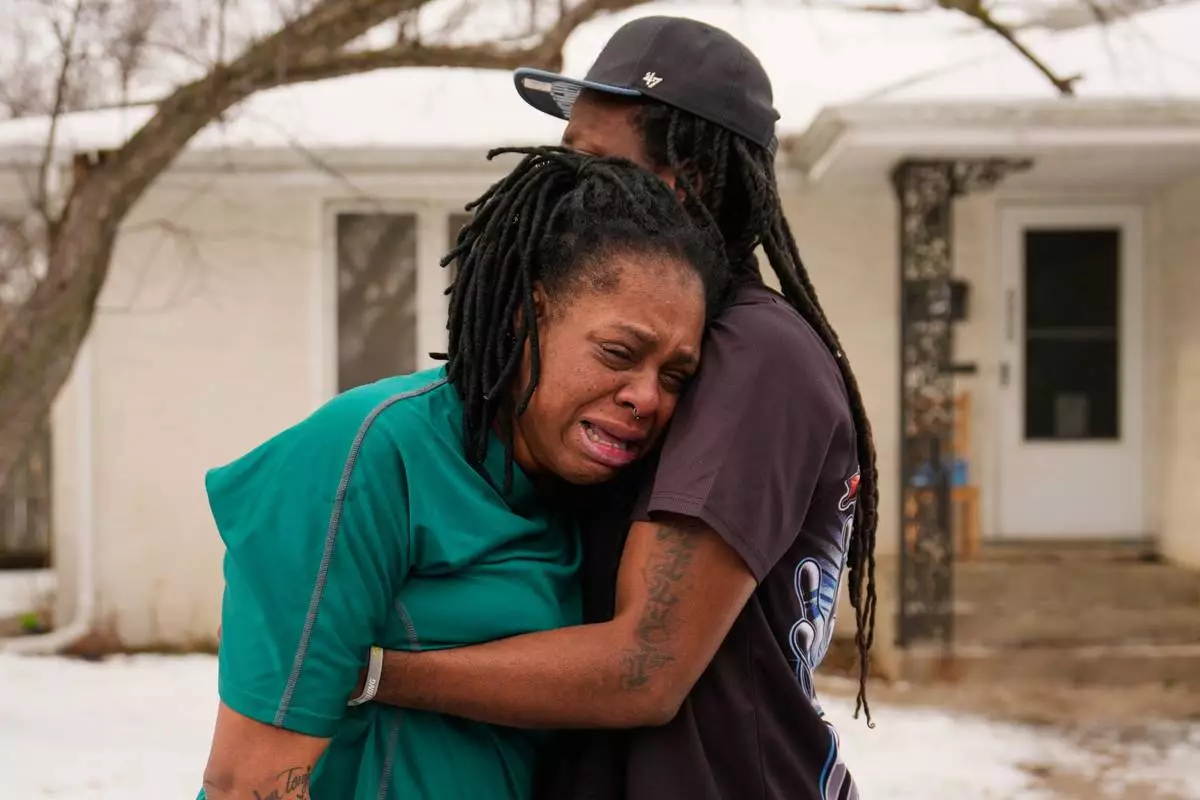
A family member reacts after federal immigration officers make an arrest Sunday, Jan. 11, 2026, in Minneapolis. (AP Photo/John Locher)

Federal agents look on after detaining a person during a patrol in Minneapolis, Minn., Sunday, Jan. 11, 2026. (Christopher Katsarov/The Canadian Press via AP)
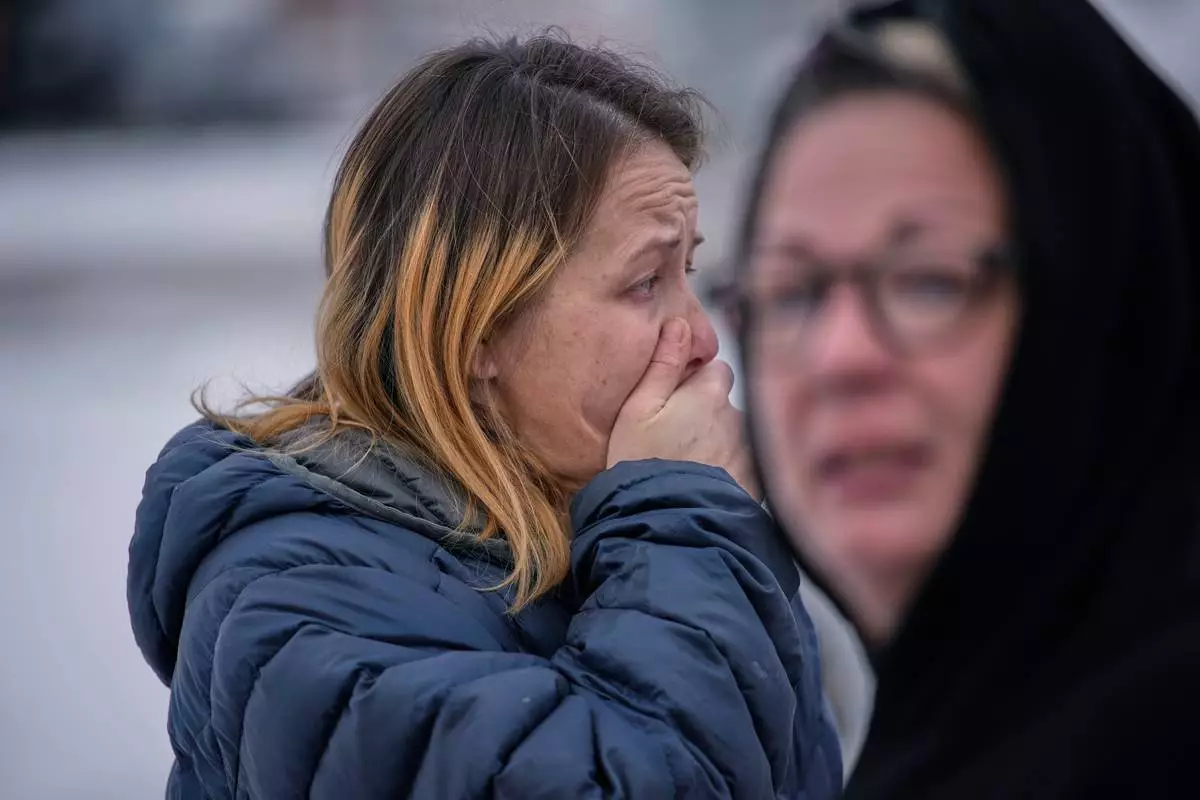
Bystanders react after a man was detained by Immigration and Customs Enforcement (ICE) agents during a traffic stop, Sunday, Jan. 11, 2026, in Robbinsdale, Minn. (AP Photo/John Locher)
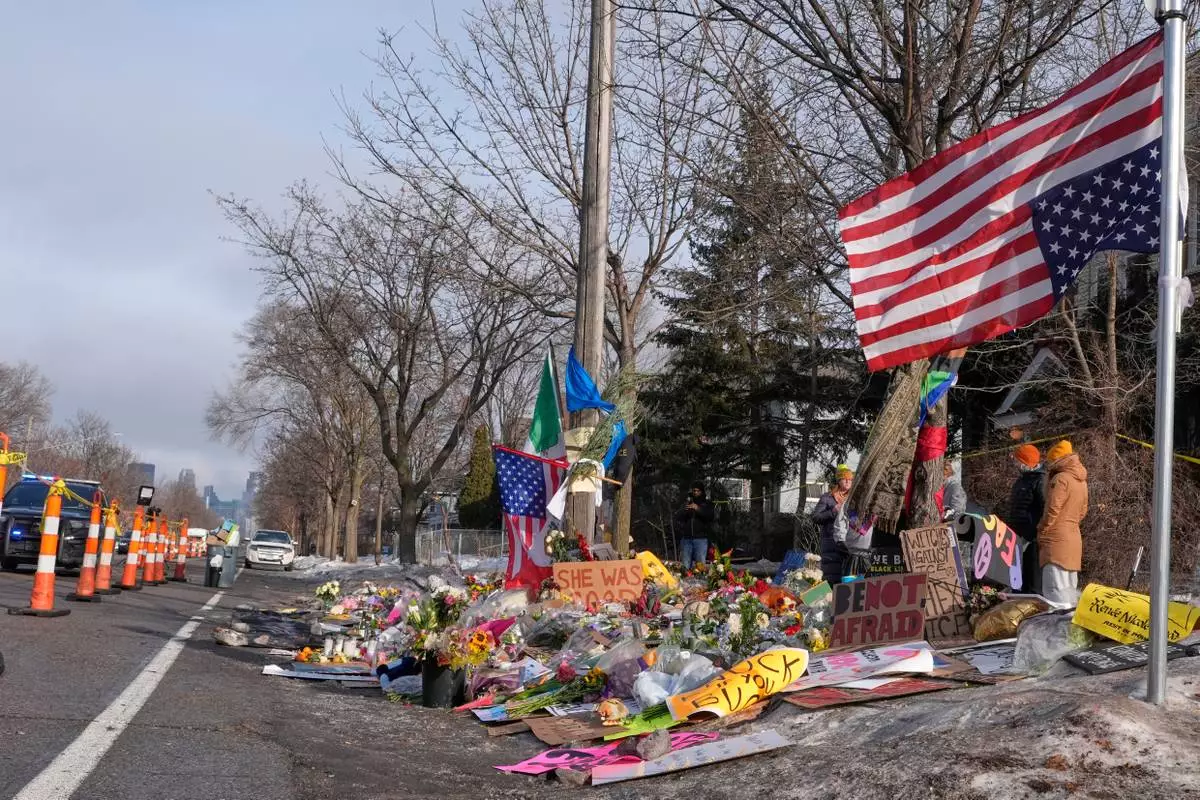
People stand near a memorial at the site where Renee Good was fatally shot by an ICE agent, Sunday, Jan. 11, 2026, in Minneapolis. (AP Photo/Jen Golbeck)
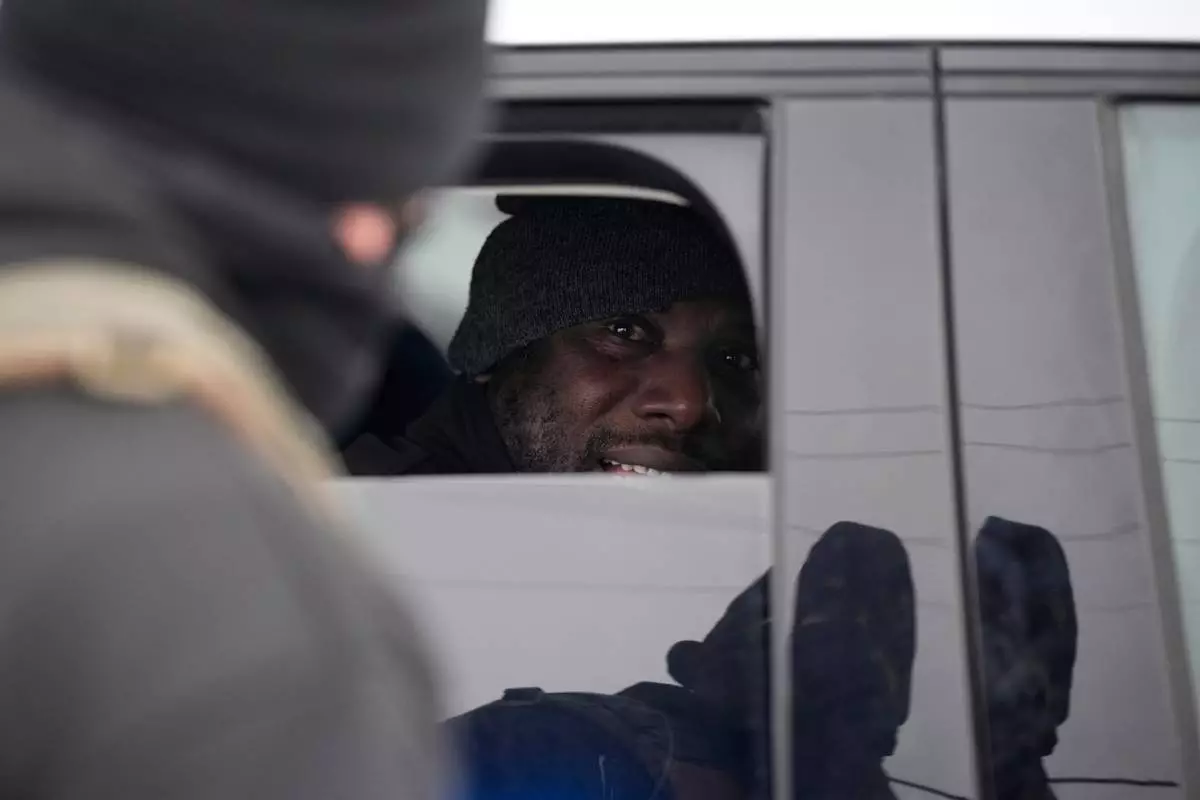
A man looks out of a car window after being detained by Immigration and Customs Enforcement (ICE) agents during a traffic stop, Sunday, Jan. 11, 2026, in Robbinsdale, Minn. (AP Photo/John Locher)
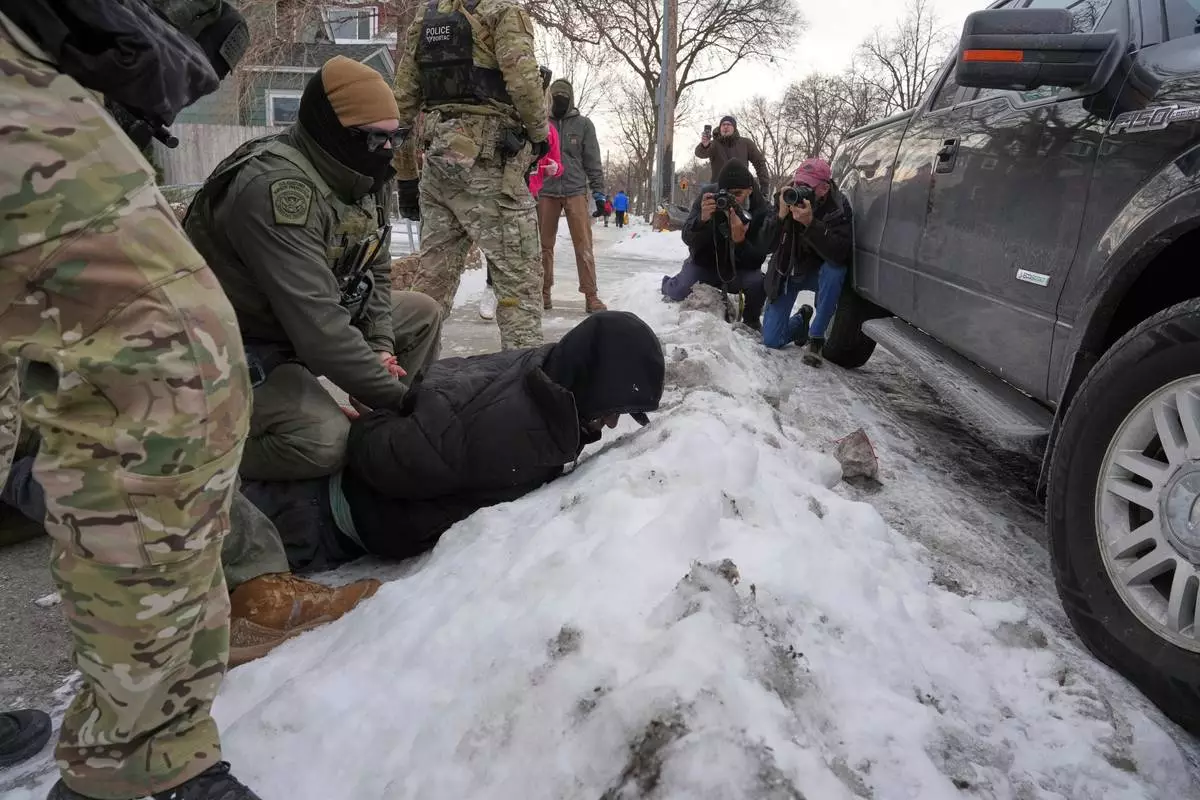
Border Patrol agents detain a man, Sunday, Jan. 11, 2026, in Minneapolis. (AP Photo/Adam Gray)

People shout toward Border Patrol agents making an arrest, Sunday, Jan. 11, 2026, in Minneapolis. (AP Photo/Adam Gray)
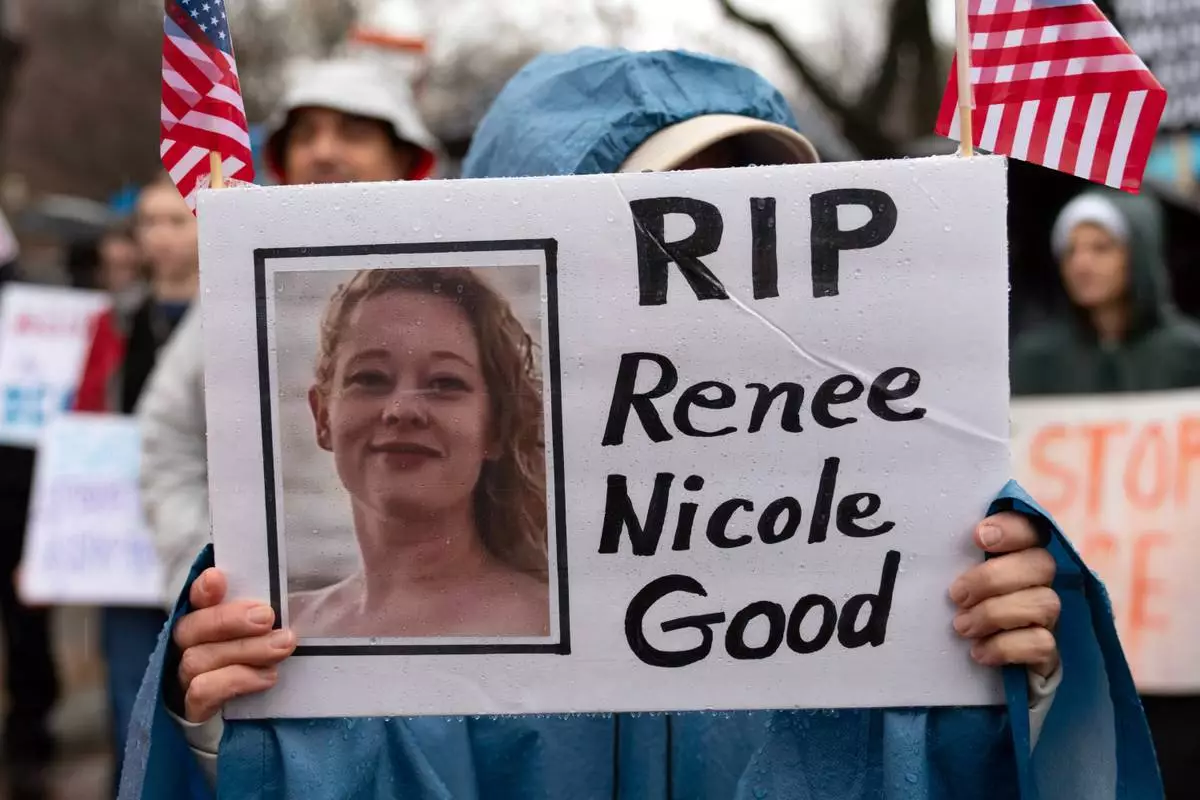
Demonstrators protest outside the White House in Washington, Saturday, Jan. 10, 2026, against the Immigration and Customs Enforcement agent who fatally shot Renee Good in Minneapolis. (AP Photo/Jose Luis Magana)
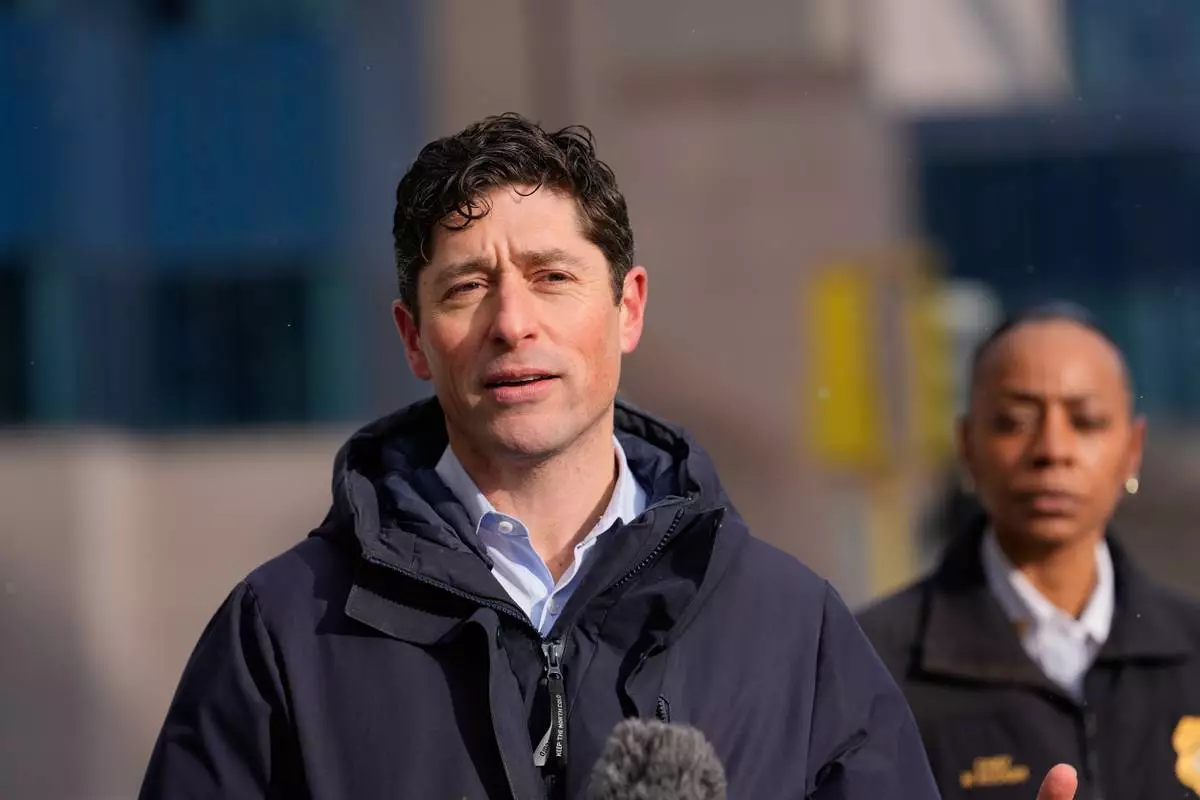
Minneapolis Mayor Jacob Frey holds a news conference on Saturday, Jan. 10, 2026, in Minneapolis. (AP Photo/Jen Golbeck)
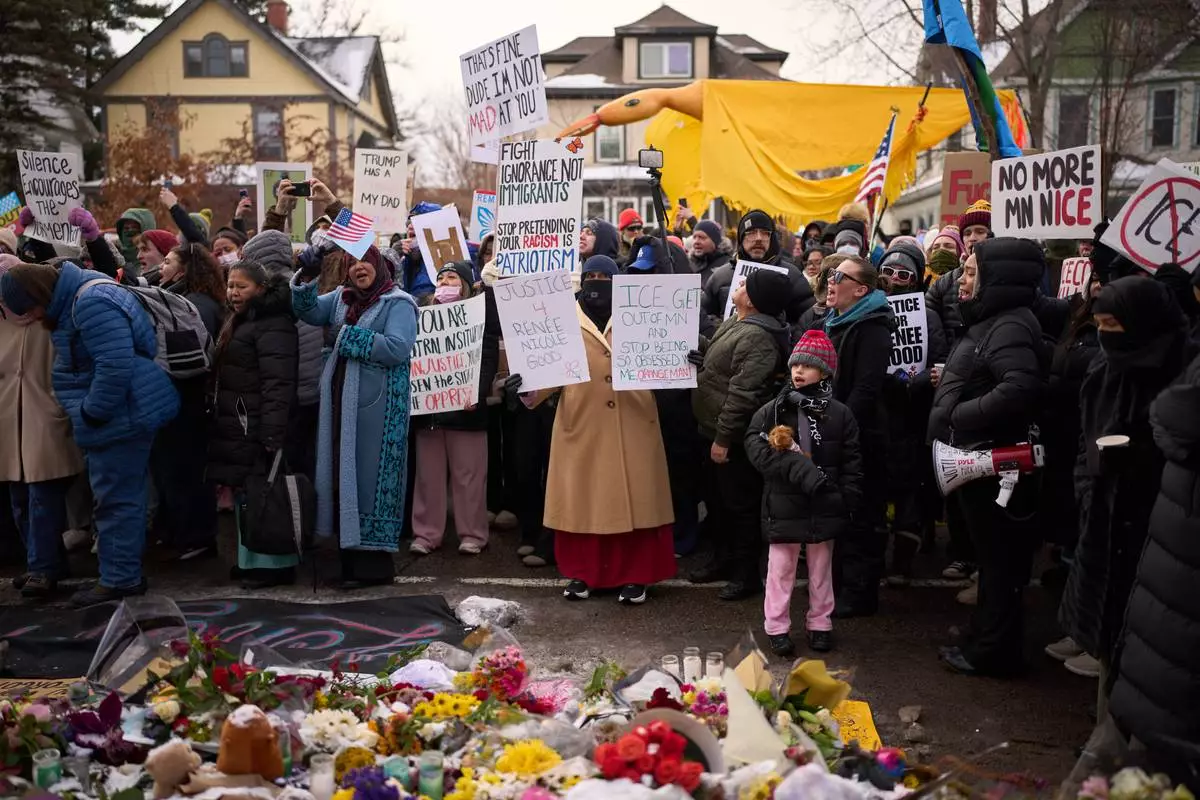
Protesters react as they visit a makeshift memorial during a rally for Renee Good, who was fatally shot by an ICE officer earlier in the week, Saturday, Jan. 10, 2026, in Minneapolis. (AP Photo/John Locher)




